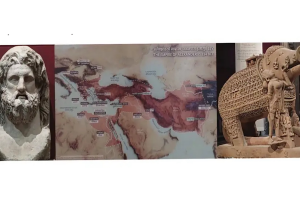It was Shakespeare’s Lear who cried out in exasperation, “Oh, argue not the need.” His daughters, Goneril and Regan, embodiments both of soulless pragmatism, argue with him on the ‘need’ to maintain a large suite of servants. Why would he need six hundred personal attendants? Why even three hundred? Or, thirty? Lear, the eighty-year-old Titan of a king, suddenly wakes up to a reality he had never faced before. It is an atrocity to pare down life, bare-bone. Who is a king, if consigned to the old-age home of meeting mere needs?
The power of Lear’s protest does not stem from the in-egalitarian insistence that a king needs an army of servants, but from the realization that every human being is a king. The Lear whom Shakespeare depicts is an ex-king. An ex-king is a mere man. No man should have to live hand-to-mouth. Human needs should not be understood on the analogy of animal needs. Beauty, not less than bread; finesse, not less than finances, is a human need. It is this belated discovery of Lear’s that makes us resonate with him.
Today, we live in the kingdom of Goneril and Regan, in an era of mundane pragmatism. We counterpoint beauty and need; unheeding the fact that, insofar as we are human, beauty is the bread of the soul. This vulgarises us more than we care to reckon. Not long ago, young people expressed their admiration for anything by parroting the Americanism, “It’s awesome!” A few years thereafter, they began to exclaim, “It’s sexy!” While we wait for the next wave of crudity to sweep in from the west, let us take note of this ~ we are slipping down the slope of vulgarity in taste and sentiments, even in the public sphere.
We rarely ever hear in the academia of this country anyone exclaiming about a talk or a book, “It’s beautiful!” It is not that beauty has evaporated altogether from life. It is that the eye of our soul is not opened to admit the radiance of beauty. Our inner ears are not open to the music of life. Our intellect is too narrow to admit the dawn of wisdom. Yet, we are surprised that men and women are growing smaller, their human sympathies narrower and their inner springs of compassion and fellow feeling weaker.
An adequate sense of style, wrote Alfred North Whitehead in The Aims of Education, is the ultimate reward of an educated mind. Bertrand Russell, in Political Ideals, identified a ‘sense of reverence’ as an essential ingredient of a cultured mind. In this he was echoing the vision of Soren Kierkegaard, who had, behind him, millennia of human endeavours in art and spirituality.
The human soul is a seat of beauty; that’s why art and religion walked hand-in-hand in the best of times. Even the human body craves for beauty. No one among us chooses, buys or wears clothes strictly to cover our nakedness. It is only the aesthetics of it that we mind.
The Greeks insisted that public life ought to be beautiful. Hence their art forms, their schools of thought, their temples, their poetry, the grandeur of their speech and conduct and, above all, the sublimity of their intellect. The Athenian concern for defining and reinforcing the moral foundations of life is inseparable from their intuition of the inherent beauty of life. Such an awareness, especially the awareness of the duty to live accordingly, is more effective than law in shoring up the moral foundations of a society.
Consider our homes. Surely, they are more than shelters for meeting mere practical needs. A home is a nest of beauty. It is a hybrid of need and beauty. Think, then, of our national home. How readily we internalize the myth that progress is no more than bijli, sadak, paani (electricity, road, water)! No more than statistical flourishes of GDP data.
Cleanliness can, then, be indexed to toilets, and need also to the beauty and dignity of being human. We dare not reckon that in this pursuit of mere material development, with its attendant reduction of human beings to crude physical mechanisms, unillumined by the light of the soul, we degrade our national home to a jungle. It is writ large over the parliamentary proceedings, over the unspeakable brutality of infant girls and the girl child being raped and killed, and in the lumpen readiness with which every crudity, every atrocity, every vulgarity is defended and explained away.
Human life is the marriage of souls with things of light. It is instinct with the undying thirst captured in the Vedic prayer, “From untruth, lead us to truth; from darkness to light, from death to immortality”. This tripartite prayer is a sublime integration of the practical and the beautiful.
Why else would the spiritual genius of India intuit the divine as sat-chid-aandanda (being-consciousness-bliss)? It would have sufficed to package God as a short-cut to instant gains, as our godmen and godwomen do to their infinite gain? Ananda (bliss) is a sphere of beauty. It expresses itself in beauty. The prime purpose of spirituality is to nourish the beauty of life.
It is a sense of, and thirst for, beauty that drives the pursuit of excellence. Only the dull in the mind would think of it as mere flourishes of manipulative intellect. Ask any author, he will tell you. Mere mastery of facts is insufficient.
Facts need to be transformed through beauty, which is the immortal longing in creativity. Even the chapati we eat has a shape and we would like it to be as perfect as possible. It is when beauty is cast out of sexuality that marital rape raises its head and hisses between sheets. The difference between a self-seeking politician and a genuine statesman rests in his soul, not in his mouth. Only an inwardly beautiful leader can lead us to the future where development becomes a celebration also of being nobly human.
The writers are an inter-religious team committed to social justice and God-centred harmony of all faiths. They can be reached at agnivesh70@gmail.com and vthampu@gmail.com











